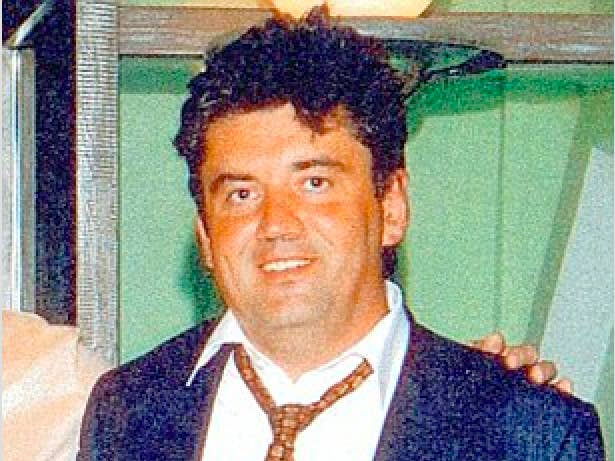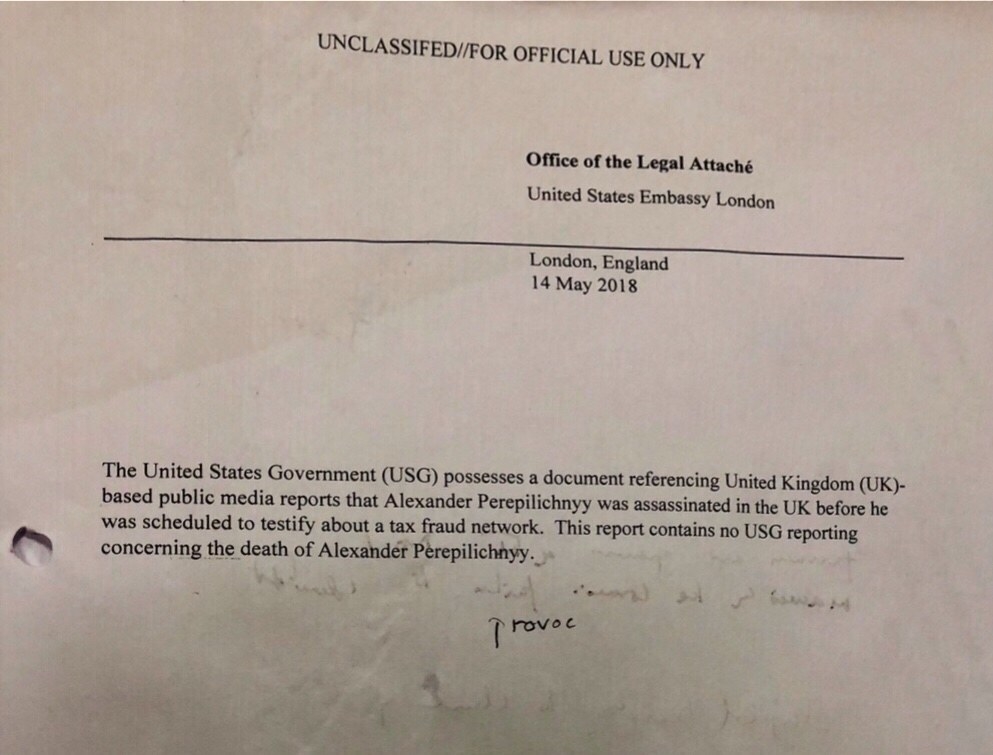
Russian whistleblower Alexander Perepilichnyy “likely” died of natural causes, an inquest into his death has ruled after police discarded potentially key evidence and the government sidelined explosive intelligence about his death.
The financier, who fled to the UK after helping to expose a massive Kremlin-linked fraud, collapsed and died while jogging outside his home in Surrey in November 2012 after a returning from a mysterious trip to Paris.
“There really is no direct evidence that he was unlawfully killed,” coroner Nicholas Hilliard QC said Wednesday, “nor compelling circumstantial evidence.” The possibility that Perepilichnyy was poisoned “cannot be completely excluded,” Hilliard said, but “more likely than not” he had died of a sudden heart attack.
BuzzFeed News revealed last year that US spy agencies had handed the British government high-grade intelligence that Perepilichnyy was likely assassinated on the direct orders of the Kremlin — but the UK authorities sidelined that and other evidence pointing to murder, instead declaring that he had died of natural causes. The financier’s death was one of 14 suspected Russian assassinations on British soil exposed by a BuzzFeed News investigation last year. In all 14 cases, the inquests concluded that the deaths had occurred by accident, natural causes, or suicide, despite the existence of explosive intelligence linking them to Russia.
Perepilichnyy’s inquest heard evidence of staggering failings in the police investigation, and was subject to multiple secrecy orders issued by senior cabinet ministers that banned the disclosure of sensitive information about the whistleblower, including whether he worked for UK intelligence.
In his ruling, Hilliard said that the police’s early decision to classify Pereplichnyy’s death as nonsuspicious “had consequences” that “affected my investigation”. No one searched the area near where Perepilichnyy died, took photographs of the crime scene, or gathered CCTV footage. A forensic postmortem wasn’t carried out until 18 days after he died.
Hilliard said that Perepilichnyy did face threats in the run-up to his death, but noted that he never took “any extra security precautions”.
Perepilichnyy’s death was initially treated as a heart attack. The case was then blown open in 2014 when a scientist testified she found possible traces of gelsemium in his stomach, a rare and deadly plant poison used by assassins. That’s when the inquest into his death reopened.
That lead later hit a dead end when further examinations found that the mysterious substance wasn’t any known toxin. Other toxicologists were also unable to find any poison after carrying out “detailed but not exhaustive” tests. Hilliard said on Wednesday that the “formerly suspicious” substance turned out to be one commonly found in meat or cheese.
The inquest heard theories about nonsuspicious causes of his death, including a sudden cardiac arrest called SADs, a hard to detect and often-inherited heart condition that carries few warning signs.
Hilliard said that there was no definitive proof that Perepilichnyy had SADs, just as there was no definitive proof he had been poisoned. “There is nothing that points specifically toward poisoning,” Hilliard said, but “equally, there is nothing specific that points away from poison.” But, Hilliard said, he did not need proof of SADs to conclude that it was the likeliest cause of death.
Forensic examinations have been limited, because the police had thrown away most of Perepilichnyy’s stomach contents soon after he died.
It was one of a catalogue of police mishaps that have dogged the case throughout. Surrey police failed to immediately realise Perepilichny was a whistleblower in Russia and were slow to refer the case to the UK police branch for national security and intelligence matters.
They lost evidence a second time when forensic computer evidence detailing threats and mysterious business deals “went missing”. And they stonewalled French police investigating Perepilichnyy’s mysterious last few days alive in Paris, meaning they never even interviewed the young Ukrainian model with whom he spent his final night, Elmira Medynska.

BuzzFeed News tracked down Medynska, who later testified in court that Perepilichnyy had seemed “very stressed” throughout the trip and kept going outside to take “mysterious” phone calls. She also spoke of how Perepilichnyy spent the night vomiting after a “bad meal”.
Surrey police said in a statement on Wednesday that Hilliard’s verdict vindicates its conclusion that Perepilichnyy died of natural causes, but acknowledged failings in how it handled the case. “Surrey Police has faced criticism around the way parts of the initial investigation were handled and we accept that some organisational errors were made in the early stages,” the statement said.
Though the forensic evidence proved elusive, there was plenty to suggest Perepilichnyy faced serious threats in the buildup to his death.
The financier had recently fled from Moscow to Britain after blowing the whistle on the multimillion-dollar tax fraud against an American hedge fund, Hermitage Capital, that implicated top Kremlin officials and mafia figures. He had begun sending information to Hermitage’s chief executive Bill Browder soon after another Russian who had helped Browder investigate the scam — lawyer Sergei Magnitsky — was found dead in police custody. Perepilichnyy was also weeks away from giving evidence to Swiss prosecutors, who were untangling a network of bank accounts used by the perpetrators to launder the stolen funds.
Perepilichnyy’s disclosures earned him dangerous enemies. He told the Swiss prosecutors he was on a Russian mafia hit list. He began receiving a stream of threatening text and Skype messages, one warning that he needed to send money “if you want to have a safe/free life”. And one of the hitmen accused of poisoning dissident spy Alexander Litvinenko went after Perepilichnyy in Russian court for multimillion-dollar “debts” the month before he died. His widow, Tatiana, also told the police in an early witness statement that they were afraid of their address being discovered by “people in Russia”.
The threats seemed to have spooked him. Shortly before his death, Perepilichnyy took out several multimillion-pound life insurance policies — including, emails show, one for “family protection purposes” in the event of his “premature” or “untimely” death.
Outside court on Wednesday, Browder blamed the verdict on an “incompetent” police investigation. “Putin must be celebrating tonight in the Kremlin,” he said.
The case has been long been shrouded in secrecy. Theresa May’s government has twice used national security powers to block the public from hearing sensitive information about Perepilichnyy and British intelligence services; Surrey police has fought hard to keep confidential documents on his death under wraps; and US intelligence believed the link of the financier’s death to the Kremlin was never heard by the court.
In the summer of 2017, BuzzFeed News revealed that MI6 had been passed high-grade intelligence indicating that Perepilichnyy was likely “assassinated on direct orders” by Russian President Vladimir Putin “or people close to him”, according to several US intelligence sources. American spies had prepared a highly classified report for lawmakers asserting with “high confidence” that Putin had sanctioned the killing. The BBC independently verified the existence and contents of the report.
The revelations upended the inquest while Hilliard looked into them. This autumn, he published a carefully worded letter from the US Embassy in London stating that the US government “possesses a document containing UK media reports that Alexander Perepilichnyy was assassinated in the UK” but that “this report contains no US government reporting on the death of Alexander Perepilichnyy”. The letter did not, however, make clear whether the document it referred to was the US report relating to Perepilichnyy’s death, or whether any other such documents did contain US government intelligence on the whistleblower.

With that letter in hand, Hilliard declared that he had looked into the matter as much as he could, and he was satisfied that the suggestion that such a report existed was “incorrect”.
Two US intelligence sources told BuzzFeed News it was unlikely that embassy staff would have the security clearance to read the highly classified report that was prepared for US lawmakers and sent to MI6. Contacted by BuzzFeed News, the US Embassy refused to clarify which “document” or “report” its letter referred to.
Hilliard addressed the issue briefly in his ruling on Wednesday, saying that he had investigated it with both the British and American governments. He said that the British government’s “robust” response to the poisoning of Russian ex-spy Sergei Skripal in Salisbury this spring suggested there was no reason the government had covered up the Perepilichnyy case.
Hilliard ended his inquest in a different political climate than when it began. For years, the government had been reluctant to pursue such cases. Even in the Litvinenko case, made famous by the staggering levels of radioactive evidence, then-home secretary Theresa May for years resisted efforts to determine who ordered the hit.
That changed with Skripal, when May responded aggressively, pointing the finger directly at the Kremlin and expelling dozens of Russian officials. Members of parliament demanded more investigation into the 14 suspicious deaths exposed by BuzzFeed News nine months previously, including Perepilichnyy. The government even promised to review the case.
That review fizzled out after a few months, with the government declaring it saw no further cause to reopen any of the cases. All that was left for Perepilichnyy was Hilliard’s verdict.
Now the case is now closed for good, barring a surprise government decision to hold a public inquiry. Much of the evidence surrounding Perepilichnyy’s death remains locked away.





